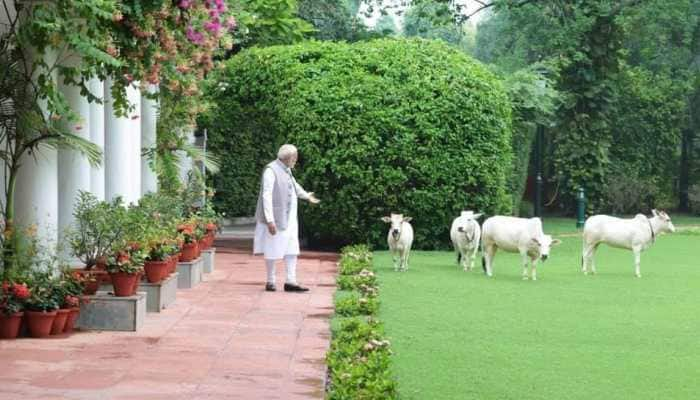All you need to know about National Investigation Agency (Amendment) Bill 2019 passed by Lok Sabha
The Bill amends the NIA Act, 2008 and provides for a national-level agency to investigate and prosecute offences listed in a schedule (scheduled offences).
Trending Photos
)
The Lok Sabha on Monday passed the National Investigation Agency (Amendment) Bill 2019 despite strong protests by the opposition parties on the floor of the House. The NIA (Amendment) Bill, 2019 was introduced in Lok Sabha by Home Minister Amit Shah on Monday (July 8, 2019). The Bill amends the NIA Act, 2008 and provides for a national-level agency to investigate and prosecute offences listed in a schedule (scheduled offences).
The new Bill also allows for the creation of Special Courts for the trial of scheduled offences which include offences under Acts such as the Atomic Energy Act, 1962, and the Unlawful Activities Prevention Act, 1967. The passage of the Bill means that the NIA will now have the power to investigate the following offences, in addition: (i) human trafficking, (ii) offences related to counterfeit currency or bank notes, (iii) manufacture or sale of prohibited arms, (iv) cyber-terrorism, and (v) offences under the Explosive Substances Act, 1908.
The new Bill gives NIA the power to investigate and prosecute offences specified in the schedule. The officers of the NIA have the same powers as other police officers in relation to the investigation of such offences, across India. The Bill states that in addition, officers of the NIA will have the power to investigate scheduled offences committed outside India, subject to international treaties and domestic laws of other countries. The central government may direct the NIA to investigate such cases, as if the offence has been committed in India. The Special Court in New Delhi will have jurisdiction over these cases, reported PRS Legislative Research.
The Bill gives power to the Centre to constitute Special Courts for the trial of scheduled offences. The Bill amends this to state that the central government may designate Sessions Courts as Special Courts for the trial of scheduled offences. The central government will need to consult the Chief Justice of the High Court under which the Sessions Court is functioning, before designating it as a Special Court. When more than one Special Court has been designated for any area, the cases will be distributed among the courts by senior-most judge. The state governments may also designate Sessions Courts as Special Courts for the trial of scheduled offences.
Below are the details of the Bill tabled by Home Minister Amit Shah in the Lok Sabha
THE NATIONAL INVESTIGATION AGENCY (AMENDMENT) BILL, 2019
BILL
to amend the National Investigation Agency Act, 2008.
BE it enacted by Parliament in the Seventieth Year of the Republic of India as follows:—
1. (1) This Act may be called the National Investigation Agency (Amendment) Act,
2019.
(2) It shall come into force on such date as the Central Government may, by notification
in the Official Gazette, appoint.
2. In the National Investigation Agency Act, 2008 (hereinafter referred to as the
principal Act), in section 1, in sub-section (2),—
(i) in clause (b), the word "and" occurring at the end, shall be omitted;
(ii) in clause (c), after the words "may be", the word "and" shall be inserted;
(iii) after clause (c), the following clause shall be inserted, namely:—
"(d) to persons who commit a Scheduled Offence beyond India against the Indian citizens or affecting the interest of India."
3. In section 2 of the principal Act, in sub-section (1), in clause (h), for the words "a Special Court constituted", the words "a Court of Session designated
as Special Court" shall be substituted.
4. In section 3 of the principal Act, in sub-section (2), after the word "India", the words "and, subject to any international treaty or domestic law of the
concerned country, outside India," shall be inserted.
5. In section 6 of the principal Act, after sub-section (7), the following sub-sections shall be inserted, namely:—
"(8) Where the Central Government is of the opinion that a Scheduled Offence has been committed at any place outside India to which this Act extends,
it may direct the Agency to register the case and take up investigation as if such offence has been committed in India.
(9) For the purposes of sub-section (8), the Special Court at New Delhi shall have the jurisdiction."
6. In section 11 of the principal Act,—
(i) in the marginal heading, for the word "constitute", the words "designate Court of Session as" shall be substituted;
(ii) in sub-section (1),—
(a) for the portion beginning with the words "The Central Government", and ending with the words "Special Courts", the words "The Central Government
shall, in consultation with the Chief Justice of the High Court, by notification in the Official Gazette, for the trial of Scheduled Offences, designate one or
more Courts of Session as Special Court" shall be substituted;
(b) the following Explanation shall be inserted, namely:—
'Explanation.—For the purposes of this sub-section, the expression "High Court" means the High Court of the State in which a Court of Session to be
designated as Special Court is functioning.';
(iii) sub-sections (3), (4), (5), (6) and (7) shall be omitted;
(iv) in sub-section (8),—
(a) for the words "by a person appointed as a Judge or an additional Judge of a Special Court", the words, brackets and figure "by the Sessions
Judge of the Court of Session referred to in sub-section (1)" shall be substituted;
(b) for the words "such judge or additional judge and the Central Government", the words "judge of the Special Court and the appointing authority
in consultation with the Central Government" shall be substituted;
(c) for the words "as may be specified in that order" occurring at the end, the words ",whichever is earlier" shall be substituted;
(v) for sub-section (9), the following sub-section shall be substituted, namely:—
"(9) When more than one Special Court is designated for an area or areas, the senior-most Judge shall distribute the business among them."
7. In section 22 of the principal Act,—
(i) in the marginal heading, for the word "constitute", the words "designate Court of Session as" shall be substituted;
(ii) in sub-section (1), for the words "constitute one or more", the words "designate one or more Courts of Session as" shall be substituted;
(iii) in sub-sections (2), (3) and (4), for the word "constituted" wherever it occurs, the word "designated" shall be substituted.
8. In the Schedule to the principal Act,-—
(i) for serial number 1 and the entry relating thereto, the following serial numbers and entries shall be substituted, namely:—
"1. The Explosive Substances Act, 1908 (6 of 1908);
1A. The Atomic Energy Act, 1962 (33 of 1962);";
(ii) in serial number 3, for the figures, brackets and word "1982 (65 of 1982)", the figures, brackets and word "2016 (30 of 2016)" shall be substituted;
(iii) in serial number 8, for entry (b), the following entries shall be substituted,
namely:—
"(b) Sections 370 and 370A of Chapter XVI of the Indian Penal Code (45 of 1860);
(c) Sections 489-A to 489-E (both inclusive) of the Indian Penal Code (45 of 1860);
(d) Sub-section (1AA) of section 25 of Chapter V of the Arms Act, 1959 (54 of 1959);
(e) Section 66F of Chapter XI of the Information Technology Act, 2000 (21 of 2000)."
STATEMENT OF OBJECTS AND REASONS
The National Investigation Agency Act, 2008 (the Act) was enacted with a view to constitute an investigation agency at the national level to investigate
and prosecute offences affecting the sovereignty, security and integrity of India, security of State, friendly relations with foreign States and offences
under Acts enacted to implement international treaties, agreements, conventions and resolutions of the United Nations, its agencies and other
international organisations.
2. In order to facilitate the speedy investigation and prosecution of Scheduled Offences, including those committed outside India against the Indian
citizens or affecting the interest of India and to insert certain new offences in the Schedule to the Act as Scheduled Offences which adversely affect the
national security, it has become necessary to amend certain provisions of the Act.
3. The National Investigation Agency (Amendment) Bill, 2019, inter alia, provides for the following, namely:—
(i) to insert a new clause (d) in sub-section (2) of section 1 of the Act so as to apply the provisions of the Act also to persons who commit a Scheduled
Offence beyond India against the Indian citizens or affecting the interest of India;
(ii) to amend sub-section (2) of section 3 of the Act to provide that the officers of the National Investigation Agency shall have the similar powers, duties,
privileges and liabilities, being exercised by the police officers in connection with the investigation of offences, not only in India but also outside India;
(iii) to amend section 6 of the Act so as to empower the Central Government, with respect to a Scheduled Offence committed outside India, to direct the
Agency to register the case and take up investigation as if such offence has taken place in India;
(iv) to amend sections 11 and 22 of the Act so as to provide that the Central Government and the State Governments may designate one or more Courts of
Session as Special Court or Special Courts for conducting the trial of offences under the Act; and
(v) to amend Schedule of the Act so as to insert certain new offences in the said Schedule.
4. The Bill seeks to achieve the above objectives.
ANNEXURE
EXTRACTS FROM THE NATIONAL INVESTIGATION AGENCY ACT, 2008
(34 OF 2008)
* * * * *
CHAPTER I
PRELIMINARY
1. (1) * * * * *
(2) It extends to the whole of India and it applies also—
* * * * *
(b) to persons in the service of the Government wherever they may be; and
(c) to persons on ships and aircrafts registered in India wherever they may be.
2. (1) In this Act, unless the context otherwise requires,—
* * * * *
(h) "Special Court" means a Special Court constituted under section 11 or, as the case may be, under section 22;
* * * * *
CHAPTER II
NATIONAL INVESTIGATION AGENCY
3. (1) * * * * *
(2) Subject to any orders which the Central Government may make in this behalf, officers of the Agency shall have throughout India in relation to the
investigation of Scheduled Offences and arrest of persons concerned in such offences, all the powers, duties, privileges and liabilities which police
officers have in connection with the investigation of offences committed therein.
CHAPTER IV
SPECIAL COURTS
11. (1) The Central Government shall, by notification in the Official Gazette, for the trial of Scheduled Offences, constitute one or more Special Courts for
such area or areas, or for such case or class or group of cases, as may be specified in the notification.
* * * * *
(3) A Special Court shall be presided over by a judge to be appointed by the Central Government on the recommendation of the Chief Justice of the High
Court.
(4) The Agency may make an application to the Chief Justice of the High Court for appointment of a Judge to preside over the Special Court.
(5) On receipt of an application under sub-section (4), the Chief Justice shall, as soon as possible and not later than seven days, recommend the name of
a judge for being appointed to preside over the Special Court.
(6) The Central Government may, if required, appoint an additional judge or additional judges to the Special Court, on the recommendation of the Chief
Justice of the High Court.
(7) A person shall not be qualified for appointment as a judge or an additional judge of a Special Court unless he is, immediately before such
appointment, a Sessions Judge or an Additional Sessions Judge in any State.
(8) For the removal of doubts, it is hereby provided that the attainment, by a person appointed as a judge or an additional judge of a Special Court, of the
age of superannuation under the rules applicable to him in the service to which he belongs shall not affect his continuance as such judge or additional
judge and the Central Government may by order direct that he shall continue as judge until a specified date or until completion of the trial of
the case or cases before him as may be specified in that order.
(9) Where any additional judge or additional judges is or are appointed in a Special Court, the judge of the Special Court may, from time to time, by
general or special order, in writing, provide for the distribution of business of the Special Court among all judges including himself and the additional
judge or additional judges and also for the disposal of urgent business in the event of his absence or the absence of any additional judge.
* * * * *
22. (1) The State Government may constitute one or more Special Courts for the trial of offences under any or all the enactments specified in the
Schedule.
(2) The provisions of this Chapter shall apply to the Special Courts constituted by the State Government under sub-section (1) and shall have effect
subject to the following modifications, namely—
(i) references to "Central Government" in sections 11 and 15 shall be construed as references to State Government;
(ii) reference to "Agency" in sub-section (1) of section 13 shall be construed as a reference to the "investigation agency of the State Government";
(iii) reference to "Attorney-General for India" in sub-section (3) of section 13 shall be construed as reference to "Advocate-General of the State".
(3) The jurisdiction conferred by this Act on a Special Court shall, until a Special Court is constituted by the State Government under sub-section (1) in
the case of any offence punishable under this Act, notwithstanding anything contained in the Code, be exercised by the Court of Session of the division in
which such offence has been committed and it shall have all the powers and follow the procedure provided under this Chapter.
(4) On and from the date when the Special Court is constituted by the State Government the trial of any offence investigated by the State Government
under the provisions of this Act, which would have been required to be held before the Special Court, shall stand transferred to that Court on the date on
which it is constituted.
THE SCHEDULE
[See section 2(1) (f)]
1. The Atomic Energy Act, 1962 (33 of 1962);
* * * * *
3. The Anti-Hijacking Act, 1982 (65 of 1982);
* * * * *
8. Offences under—
* * * * *
(b) Sections 489-A to 489-E (both inclusive) of the Indian Penal Code (45 of 1860).
Live Tv







)
)
)
)
)
)
)
)
)
)
